As part of the economic pressure on Russia many private companies – such as Apple, Coca-Cola, Goldman Sachs, IKEA, McDonald’s, Microsoft, Porsche and Toyota – have left or downsized their operations in Russia. In retaliation, Russia is threatening the intellectual property rights of businesses associated with sanctioning countries, which they call “unfriendly” countries. On March 6th 2022, the Kremlin issued a decree that grants a no-cost license to steal patents held by owners in “unfriendly” countries, including the US and UK. This decree only mentions patents, but Russian courts have begun using it to undermine copyright and trademark rights.The British children’s television character Peppa Pig is a target of Russia’s attack on IP rights. Peppa Pig is produced by Entertainment One, in the UK. Last January, Entertainment One sued Ivan Kozhevnikov, a Russian national, for 40,000 rubles ($550). The suit accused Kozhevnikov of infringing the Peppa Pig trademark and other intellectual property. On March 2, 2022, Judge Andrei Slavinsky threw out the case, citing American and British sanctions against Russia as justification for refusing to recognize Entertainment One’s intellectual property rights.Less than two weeks after that order, people have begun putting in trademark applications that copy famous American brands in Russia, including Starbucks and McDonalds. One trademark application recently filed includes a copy of the McDonald’s golden arches logo with “Uncle Vanya” written below it. Trademark applications have also been listed for “Starducks”, “Makdonalds” and “Makdak” – all three from the same applicant.Part of the US sanctions against Russia mean that American companies are prohibited from applying for patent or trademark protection in Russia after June 23, 2022. After June 23, these companies may have to abandon their Russian intellectual property registrations. Even if these registrations could continue, there is doubt that they would receive any meaningful IP protection in Russia. For example, there have been reports of Russian officials cancelling raids that would have targeted counterfeit merchandise.Sources
Peppa Pig, McDonald’s and Starbucks’ IP in Russia
Recommended Reading: The Canadian Telecommunications Industry
Hi everyone,
Ryan Buchanan and myself (Mike Gargaro) will be presenting next week on the Canadian telecommunications industry and the proposed Rogers-Shaw merger. For some background info on these topics, feel free to check out Michael Geist’s podcast that discusses telecommunications competition in Canada as well as the status of the Rogers-Shaw merger. We’ve also provided a link to a brief article from Bloomberg that discusses the CRTC’s approval of the merger.
Michael Geist podcast (discussion about the merger starts at about 24 minutes in): https://www.michaelgeist.ca/2022/03/law-bytes-podcast-episode-120/
Bloomberg Article: https://www.bnnbloomberg.ca/rogers-shaw-deal-wins-conditional-approval-from-crtc-1.1742651
Cyberwarfare in Russia/Ukraine
I wrote the following based off two articles Professor Festinger had mentioned in March 8th Communications Class regarding the cyberwarfare by Russia against Ukraine.
What is Cyberwarfare?
Cyberwarfare is the use of computer technology to disrupt the activities of a state or organisation. It involves the deliberate attacking of information systems for strategic or military purposes. Cyber attacks can cause electrical blackouts, failure of military equipment and breaches of national security secrets.
Example – Russia/Ukraine
As well as attacking on the ground, Russia has been using cyberwarfare tactics in its invasion of Ukraine. This is not the first time that Russian hackers have been tied to attacks in Ukraine. In 2015, after Russian invasion of the Crimean Peninsula, Russian hackers knocked out electric power for around 230,000 customers in Western Ukraine. This happened again the following year to government agencies and the banking system in Ukraine. Most recently, Ukraine was hit particularly hard by a malware which is designed to wipe data. It has been argued that Russia has been using the war with Ukraine as a “live testing ground” for its next generation of cyber weapons and there is a real worry about a potential global cyberwar. This could be extremely destructive given the interdependence of critical infrastructure sectors and there is a potential to lose clean water, electricity and financial markets.
The Canadian government’s Communications Security Establishment Cyber Centre has noted that although is not aware of any “current specific threats to Canadian organizations in relation to events in and around Ukraine,” there has been an “historical pattern of cyber attacks on Ukraine having international consequences.” For example, in 2017 Russian hackers launched a ransomware attack in Ukraine known as “NotPetya” which encrypted any data it reached, leaving the data’s unsuspecting owner locked out from accessing their own files. Victims were told to pay a ransom of $300 bitcoin if they wanted access to their data. But the ransomware attack spread beyond Ukraine’s borders and infected computer networks of companies around the world supposedly resulting in more than $10 billion in total loss in damages. The NotPeta attack is now regarded as one of the worst cyberattacks in modern history.
Retaliation
Government’s do seem to be slightly better prepared to retaliate to cyber attacks – according to President Biden, the US can and will launch cyberattacks on Russia, but only if Russia attacks the US first. However, there is more of a worry that the private sector in particular is not sufficiently prepared to protect itself against cyberattacks. It has been argued that many companies simply view cybersecurity programs as “a line item on a budget sheet” which can leave them vulnerable to disruption. Individuals are at potential cybersecurity risk too and it has been recommended that individuals ensure their online presence is secured. Some ways to do so are basic e.g. giving yourself strong passwords, enabling two factor authentications and keeping systems updated.
Other forms of retaliation have been through smaller groups. For example, over 311,000 people have joined a group called “IT Army of Ukraine”. Not all members are from Ukraine but a significant number are. They are splitting their time between doing their day jobs and fighting the cyber war with Russia. The group has helped carry out multiple cyberattacks since the war started by targeting Russian government websites, banks and currency exchanges. These people can be seen as serving Ukraine “on the digital frontline”. The hacktivist collective Anonymous have also gotten involved in the cyberwar. They claim to have successfully infiltrated Russian state TV to show citizens the devastation of Putin’s invasion of Ukraine. They also hacked 92 Russian databases which belonged to retailers, Russia internet providers and intergovernmental websites. Many files were erased, and hundreds of folders were renamed to things including “putin_stop_this_war” and “glory_to_ukraine”.
Solution – Pull Russia Offline?
It could be argued that a better and simpler solution here would be for Russia to be excluded from the internet. However, the Internet Society has argued that this goes against fundamental principle that the internet is for everyone. They argue that the internet allows people who otherwise would be silenced to speak; that the idea of unplugging a country is as wrong as when governments wish to do it to their own people; and that all should have access to the internet since it is “the greatest communication tool ever invented.” While these principles make sense in the long run, it can be argued that given the gravity of the current situation – i.e. that WWIII could break out/a global cyberwar could start – it may be a wise decision to remove Russia from the internet. To do so would take away a large part of their power in cyberwarfare.
Further, it can be argued that the internet is already splintered. Indeed, the Western internet looks much different to China’s where they have the Great Firewall. Thus, it can be said that such an internet is for everyone approach is unrealistic and is not a sufficient reason to keep Russia online given the current circumstances. In the short term, it would be wise to pull Russia offline.
Sources
https://www.vox.com/recode/22950633/cyberattacks-russia-ukraine-us-cyberwar
https://hbr.org/2022/03/what-russias-ongoing-cyberattacks-in-ukraine-suggest-about-the-future-of-cyber-warfare
https://www.seattletimes.com/business/technology/as-russian-tanks-rolled-into-ukraine-so-did-malware-then-microsoft-entered-the-war/
https://www.cnbc.com/2022/03/23/ukrainian-coders-splitting-their-time-between-day-job-and-cyberwar.html
https://fortune.com/2022/03/18/anonymous-cyberwar-on-putins-ukraine-invasion/
https://www.cnbc.com/2022/03/16/what-has-anonymous-done-to-russia-here-are-the-results-.html
https://www.vox.com/2022/3/19/22986316/russia-ukraine-cyber-attacks-holding-back
STIR/SHAKEN Tech: Combating Robocalls/Caller ID spoofing in Canada
Hi everyone,
I have received 8 spam calls over the last 2 weeks so I thought I’d look up what the CRTC has been doing regarding these pesky calls. Apparently, late last year the CRTC required Canadian telecommunications providers to implement new STIR(Secure Telephony Information Revisited)/SHAKEN (signature-based handling of asserted information using tokens) technology (must’ve been a Bond fan that came up with that acronym) to help combat robocalls. This technology is supposed to verify whether calls made from the internet are legit or not and notify consumers. Prior to this tech, caller ID spoofing has been pretty rampant, often tricking people with what seems like a legitimate number calling them on their caller ID but in reality, it is some spam caller calling over the internet. According to the CBC article, I linked below, 25% of all calls made in Canada are robocalls. That number was a lot higher than I thought it’d be and clearly indicates the magnitude of this problem. This STIR/SHAKEN technology helps consumers know whether or not the calls are from a legit source (aka help with ID spoofing), but it seems it does not actually filter out the calls and block them. Bell ran a trial using AI that blocked spam callers between July 2020 and October 2021 and during this period they blocked 1.1 billion calls. Bell has applied to the CRTC to permanently block callers that they know are fraudulent and the CRTC is reviewing their application. Hopefully, the CRTC and Canadian telecommunications providers can work out a solution to eliminate, or at least reduce the number of spam calls that actually reach our phones in the near future because I for sure do not know any people from San Antonio, Fresno, or Regina.
– Amit Chandi
PS* register your number on the ‘National Do Not Call List’ to prevent telemarketers from calling you – might help with some of the calls, register here: https://lnnte-dncl.gc.ca/en
https://www.cbc.ca/news/business/crtc-telecom-call-authentification-1.6250599
Section 230 Communications Decency Act Development
An interesting development for platform immunity in the US:
Section 230 of the Communications Decency Act is the US law that protects websites from lawsuits based on content posted by third parties. It is what shields platforms like Facebook from being treated as publishers. When researching Section 230 for my paper, I have noticed there has been a lot of buzz about potentially legislating to restrict the immunity provided by the Act. However, I came across an interesting development from the US Supreme Court which indicates that legislation may not be the only route to changing the provision. In a March 7th ruling, Justice Thomas indicated that if Congress doesn’t move to clarify the scope of Section 230, the Supreme Court “should do so in an appropriate case”. It will be interesting to see if his statement builds pressure to push through legislation that would limit Section 230’s protection. You can read the decision here: https://www.supremecourt.gov/orders/courtorders/030722zor_1a7d.pdf#page=7
– Adam Sanders
The Impact of Bill C-10/C-11 on Streaming Services
Hi everyone! Myself (Emma Jerrott) and my group (Madison Dutkiewicz, Laura Danton and Amory Hall), have prepared a presentation on the impact that Bill C-11 Ould have on streamed television content. You should be able to access it here on Google Drive (you may have to download it): https://drive.google.com/file/d/1-ckZmldJtDck5QGEfCX1xRnIjD3tgqy4/view?usp=sharing
If you have any trouble with accessing the project please let me know
If you did not see our previous post with reading materials please check back and give the articles a read!
If you have any questions or thoughts we would love to hear your comments!
– Emma, Madison, Laura and Amory
Presentation Slides and Recommended Material: Responsible Corporate Communication
Hi Everyone,
Please find attached my draft slides for my presentation: Corporate Communication
Readings for Emma, Madison, Laura, & Amory
Hi everyone!
Myself, Madison Dutkiewicz, Amory Hall, and Laura Danton will be posting our presentation next week, entitled: The Impacts of Bill C-10/11 on Streaming Services.
In preparation we have two articles for you all to read.
Firstly, we have an Article by Rachel Gilmore of Global News, examining Bills C-10 and C-11 and how they may affect streaming and freedom of expression.
Read the article here:
https://globalnews.ca/news/8592505/online-streaming-bill-c-11-free-speech/amp/
Second, please read Steven Zeitchik’s “Does Netflix Have a Killer Problem” in the Chicago Tribune. This article examines the violence that is prolific on Netflix television, and the many reasons that this may be problematic.
Read this article here:
https://www.chicagotribune.com/entertainment/tv/ct-ent-netflix-violence-20190321-story.html
If you have any comments or questions regarding these articles please comment below – our group would love to discuss them with you.
We look forward to sharing our presentation next week.
– Emma, Madison, Laura, and Amory
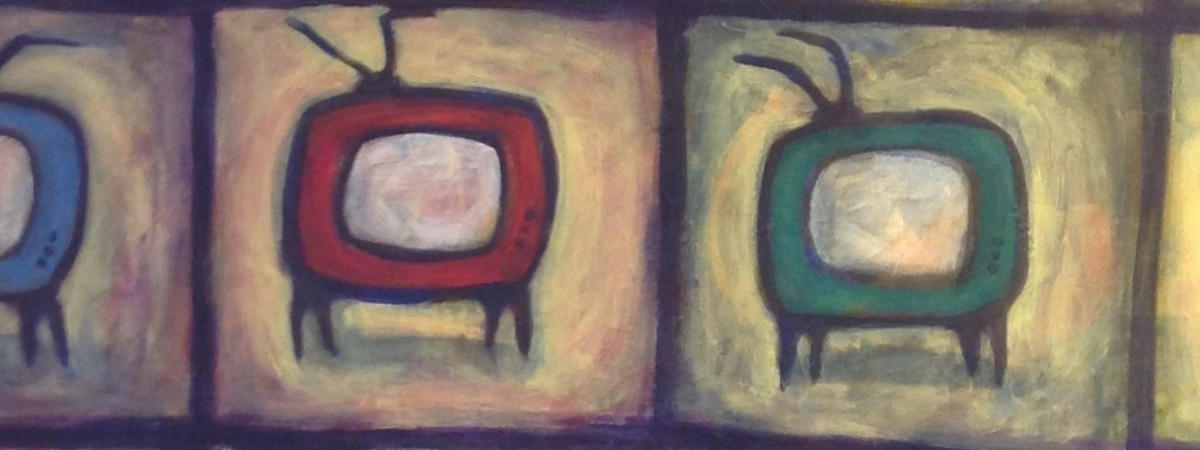
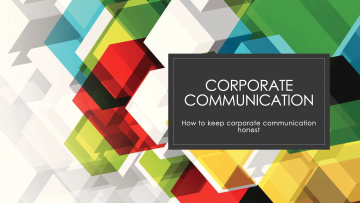
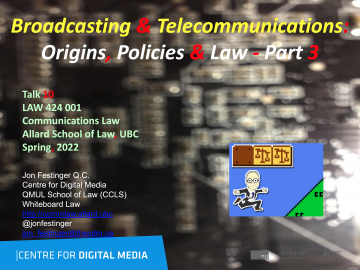
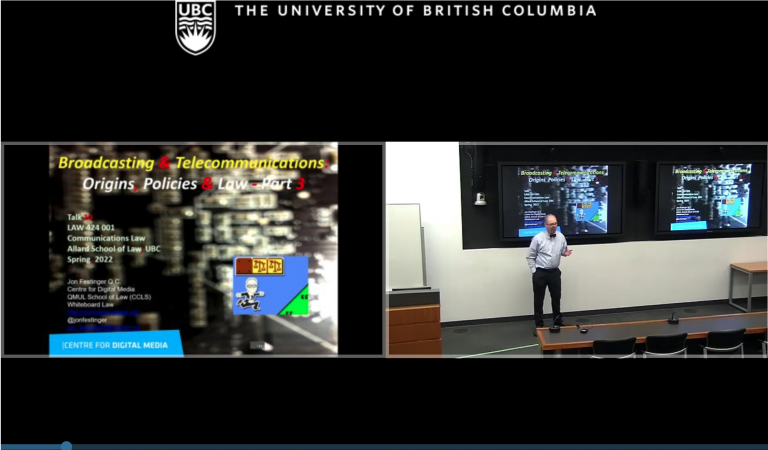

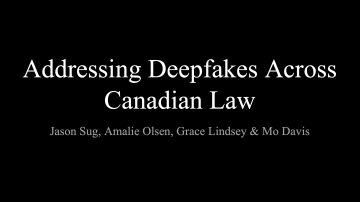
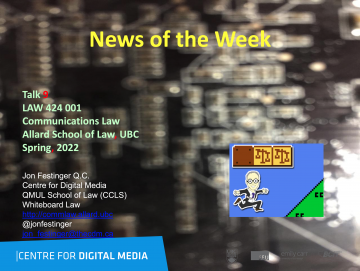
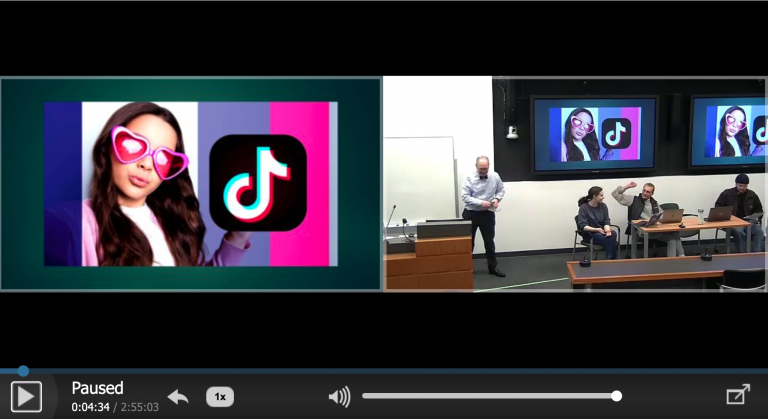
 Communications Law
Communications Law